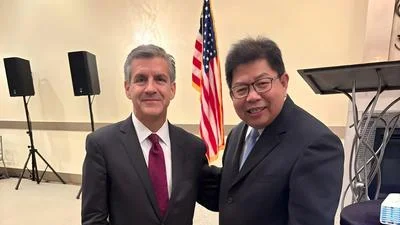Former Illinois State Representative Jeanne Ives | Jeanne Ives/Facebook
Former Illinois State Representative Jeanne Ives | Jeanne Ives/Facebook
Former Illinois State Representative Jeanne Ives said allowing college students to register to vote without proper identification is "one more example of the softening of standards in Illinois."
"I know college students can choose whether to vote from their hometown or from their dorm room," Ives told DuPage Policy Journal. "Regardless, the documentation to register to vote that is set out in statute does not include a generic letter from a university administrator without a specific address."
"Allowing hundreds of students to register to vote this way is just one more example of the softening of standards in Illinois," she said.
Her comments come in response to hundreds of Wheaton College students attempting to register to vote using a letter from the school's dean for their proof of residency.
They were initially turned away from the Rice Lake Park District polling site during early voting, after election judges rejected the letter from the College's dean as sufficient proof of residency. The letter confirmed the students' enrollment and that they receive mail at the school, but election judges deemed it insufficient under Illinois election law.
The judges also cited two local referendum questions on the ballot, which they argued affected property tax payers—students, who typically do not own property in Wheaton, were not eligible to vote on those issues.
After the students were denied ballots, the College’s dean contacted the DuPage County Election Division, according to a statement from Milton Township Precinct Committeeman Chuck Smith. A senior official intervened, instructing the polling judges to accept the dean's letter as valid residency proof. The students were then allowed to vote.
Post-election, it was revealed that Wheaton College's precinct had the highest turnout in DuPage County, with more than 90% of eligible voters participating.
Kane County reported a similar situation of registering voters for the general election without sufficient proof of identification and residency.
The Kane County Reporter announced a Freedom of Information Act was sent to Kane County Clerk John A. Cunningham requesting “all written communication, texts, emails, message boards between clerks office and election judges on Election Day through Nov. 6” and “copies of all voice messages left for election judges and the clerk’s office on Election Day through Nov 6.”
In response Cunningham’s office said “the Kane County Clerk’s office does not have any documents pertinent to your request.”
Additionally, Cunningham’s office denied in part a request by the Kane County Reporter for a variety of documents related to voter registrations from the November 2024 election, including a list of Election Day registrants, copies of registration forms and identification details used for registrations. Cunningham’s office said while voter registration forms are available to view within the office they cannot be photocopied and transferred.
Attorney Edward “Coach” Weinhaus, managing partner at FOIASolved, a law firm with a multi-state presence focusing on FOIA-related litigation, disputed the Kane County Clerk’s response to both FOIA requests.
"Kane County is either the picture of perfection with 73 pages of same day voters and not a single email or voicemail to an election judge or the most corrupt, vote-gathering jurisdiction that counts only *live* voters in the Chicago metro area,” Weinhaus told the Kane County Reporter.
“You can just take their word for it that these are real people or you can review but not disseminate registrations. I can save you the trip- there are no copies of ID’s on offer."
The Kane County Clerk’s FOIA refusals come only four years after Cunnigham’s office faced criticism over its handling of the 2020 presidential election where potential widespread problems with vote tallies and irregularities were revealed in an election integrity report produced by Geneva-based Three Headed Eagle Alliance.
That report, which focused on a single polling place in Kane County, revealed significant issues such as nearly 40,000 mail-in ballots lacking required initials and hundreds of voters over 100 years old – some as old as 121 which is five years older than the oldest living person today – casting ballots in the 2020 General Election.
That report, based on FOIAs conducted by the Geneva-based Three Headed Eagle Alliance, also included a filing from former state senator and congressional candidate Jim Oberweis highlighting anomalies across the county.
Oberweis narrowly lost that election garnering 49.3% of the vote with 197,835 votes to U.S. Rep. Lauren Underwood (D-Ill.) 50.7% of the vote with 203,209 votes.
Despite these findings, the Kane County Clerk’s Office was then, as now, reluctant to release all requested records, including crucial poll tapes, raising concerns about transparency in the election process.
Subsequently, the Three Headed Eagle Alliance has been engaged in more pollwatching activities in recent election cycles, including 2024.
In an interview with ABC 7 Chicago Cunningham expressed concern over those seeking to get more involved in the Election Day oversight process.
"We're worried about Election Day," Cunningham said. "They tried the last election, they sent a lot of their group, one of the groups, sending a lot of poll watchers. Now they're trying to become judges. So we got to watch for that."






 Alerts Sign-up
Alerts Sign-up